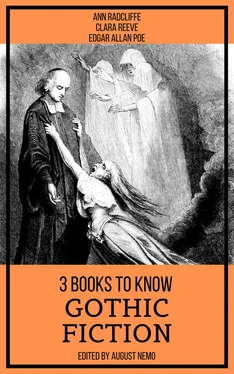Robert, to whom the keys had been entrusted, was severely interrogated by the marquis. He persisted in a simple and uniform declaration of his innocence; but as the marquis believed it impossible that Julia could have escaped without his knowledge, he was ordered into imprisonment till he should confess the fact.
The pride of the duke was severely wounded by this elopement, which proved the excess of Julia’s aversion, and compleated the disgraceful circumstances of his rejection. The marquis had carefully concealed from him her prior attempt at elopement, and her consequent confinement; but the truth now burst from disguise, and stood revealed with bitter aggravation. The duke, fired with indignation at the duplicity of the marquis, poured forth his resentment in terms of proud and bitter invective; and the marquis, galled by recent disappointment, was in no mood to restrain the impetuosity of his nature. He retorted with acrimony; and the consequence would have been serious, had not the friends of each party interposed for their preservation. The disputants were at length reconciled; it was agreed to pursue Julia with united, and indefatigable search; and that whenever she should be found, the nuptials should be solemnized without further delay. With the character of the duke, this conduct was consistent. His passions, inflamed by disappointment, and strengthened by repulse, now defied the power of obstacle; and those considerations which would have operated with a more delicate mind to overcome its original inclination, served only to encrease the violence of his.
Madame de Menon, who loved Julia with maternal affection, was an interested observer of all that passed at the castle. The cruel fate to which the marquis destined his daughter she had severely lamented, yet she could hardly rejoice to find that this had been avoided by elopement. She trembled for the future safety of her pupil; and her tranquillity, which was thus first disturbed for the welfare of others, she was not soon suffered to recover.
The marchioness had long nourished a secret dislike to Madame de Menon, whose virtues were a silent reproof to her vices. The contrariety of their disposition created in the marchioness an aversion which would have amounted to contempt, had not that dignity of virtue which strongly characterized the manners of madame, compelled the former to fear what she wished to despise. Her conscience whispered her that the dislike was mutual; and she now rejoiced in the opportunity which seemed to offer itself of lowering the proud integrity of madame’s character. Pretending, therefore, to believe that she had encouraged Ferdinand to disobey his father’s commands, and had been accessary to the elopement, she accused her of these offences, and stimulated the marquis to reprehend her conduct. But the integrity of Madame de Menon was not to be questioned with impunity. Without deigning to answer the imputation, she desired to resign an office of which she was no longer considered worthy, and to quit the castle immediately. This the policy of the marquis would not suffer; and he was compelled to make such ample concessions to madame, as induced her for the present to continue at the castle.
The news of Julia’s elopement at length reached the ears of Ferdinand, whose joy at this event was equalled only by his surprize. He lost, for a moment, the sense of his own situation, and thought only of the escape of Julia. But his sorrow soon returned with accumulated force when he recollected that Julia might then perhaps want that assistance which his confinement alone could prevent his affording her.
The servants, who had been sent in pursuit, returned to the castle without any satisfactory information. Week after week elapsed in fruitless search, yet the duke was strenuous in continuing the pursuit. Emissaries were dispatched to Naples, and to the several estates of the Count Vereza, but they returned without any satisfactory information. The count had not been heard of since he quitted Naples for Sicily.
During these enquiries a new subject of disturbance broke out in the castle of Mazzini. On the night so fatal to the hopes of Hippolitus and Julia, when the tumult was subsided, and all was still, a light was observed by a servant as he passed by the window of the great stair-case in the way to his chamber, to glimmer through the casement before noticed in the southern buildings. While he stood observing it, it vanished, and presently reappeared. The former mysterious circumstances relative to these buildings rushed upon his mind; and fired with wonder, he roused some of his fellow servants to come and behold this phenomenon.
As they gazed in silent terror, the light disappeared, and soon after, they saw a small door belonging to the south tower open, and a figure bearing a light issue forth, which gliding along the castle walls, was quickly lost to their view. Overcome with fear they hurried back to their chambers, and revolved all the late wonderful occurrences. They doubted not, that this was the figure formerly seen by the lady Julia. The sudden change of Madame de Menon’s apartments had not passed unobserved by the servants, but they now no longer hesitated to what to attribute the removal. They collected each various and uncommon circumstance attendant on this part of the fabric; and, comparing them with the present, their superstitious fears were confirmed, and their terror heightened to such a degree, that many of them resolved to quit the service of the marquis.
The marquis surprized at this sudden desertion, enquired into its cause, and learned the truth. Shocked by this discovery, he yet resolved to prevent, if possible, the ill effects which might be expected from a circulation of the report. To this end it was necessary to quiet the minds of his people, and to prevent their quitting his service. Having severely reprehended them for the idle apprehension they encouraged, he told them that, to prove the fallacy of their surmises, he would lead them over that part of the castle which was the subject of their fears, and ordered them to attend him at the return of night in the north hall. Emilia and Madame de Menon, surprised at this procedure, awaited the issue in silent expectation.
The servants, in obedience to the commands of the marquis, assembled at night in the north hall. The air of desolation which reigned through the south buildings, and the circumstance of their having been for so many years shut up, would naturally tend to inspire awe; but to these people, who firmly believed them to be the haunt of an unquiet spirit, terror was the predominant sentiment.
The marquis now appeared with the keys of these buildings in his hands, and every heart thrilled with wild expectation. He ordered Robert to precede him with a torch, and the rest of the servants following, he passed on. A pair of iron gates were unlocked, and they proceeded through a court, whose pavement was wildly overgrown with long grass, to the great door of the south fabric. Here they met with some difficulty, for the lock, which had not been turned for many years, was rusted.
During this interval, the silence of expectation sealed the lips of all present. At length the lock yielded. That door which had not been passed for so many years, creaked heavily upon its hinges, and disclosed the hall of black marble which Ferdinand had formerly crossed. ‘Now,’ cried the marquis, in a tone of irony as he entered, ‘expect to encounter the ghosts of which you tell me; but if you fail to conquer them, prepare to quit my service. The people who live with me shall at least have courage and ability sufficient to defend me from these spiritual attacks. All I apprehend is, that the enemy will not appear, and in this case your valour will go untried.’
No one dared to answer, but all followed, in silent fear, the marquis, who ascended the great stair-case, and entered the gallery. ‘Unlock that door,’ said he, pointing to one on the left, ‘and we will soon unhouse these ghosts.’ Robert applied the key, but his hand shook so violently that he could not turn it. ‘Here is a fellow,’ cried the marquis, ‘fit to encounter a whole legion of spirits. Do you, Anthony, take the key, and try your valour.’
Читать дальше












